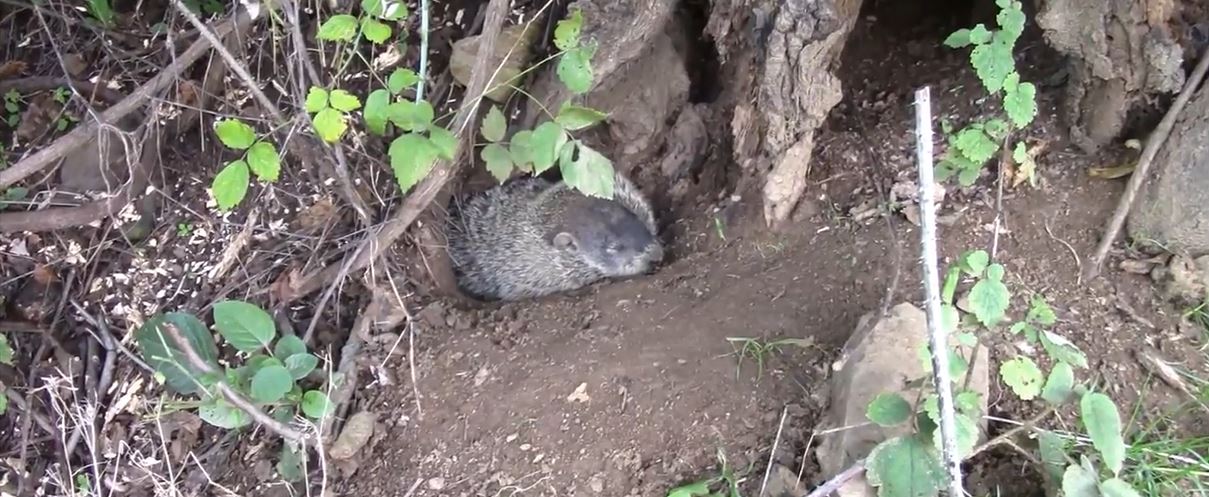Groundhog Repellent

If you take pride in your lawn or have a vegetable or flower garden, then you most likely see groundhogs as a major nuisance. These animals can eat their way through your garden in an attempt to fill themselves up and prepare for winter hibernation. They may also disrupt an otherwise beautiful landscape with their large dens and complex tunnel systems. In some cases, groundhogs may also transmit disease so it is in everyone's best interest to try to keep them off their property. When trying to prevent groundhogs, repellent is the most popular option as it should be fairly easy to use. There are numerous options available, some of which work better than others.
Do They Work?
Before turning to repellent as the answer to all your groundhog problems, take some time to consider whether it will work. Unfortunately, most repellents will not give you a long-term solution, instead providing temporary relief or none at all. To truly prevent groundhogs, you typically need fences and home repairs that can keep them out of your home or garden.
Castor Oil
To use castor oil as a groundhog repellent, you should put about a spoonful in the animal's burrow and then seal it up with dirt. This should deter the groundhogs from returning to their burrows as they don't like the smell. An alternative is to mix a half cup of the oil with two cups or more of water. You can then spray the mixture around your property to stop the animals from eating things. Keep in mind, however, that this homemade repellent may or may not work and will need to be reapplied every two or three weeks as well as after every time it rains.
Pepper
People also suggest using pepper as a groundhog repellent. You can just take a bit of pepper of any type, such as red, chili, or cayenne, and sprinkle it into burrow holes before covering them up using dirt. As with castor oil, you can also make a pepper solution to spray around your property. To do this, mix about four spoonfuls of pepper and two cups of warm water. As with castor oil, you will have to reapply this repellent at least every two or three weeks and there isn't a guarantee it will work.
Eggs
Some people also suggest using eggs in the entrances of groundhog burrows to repel them. To do this, simply crack an egg into the burrow and then close it up. Keep in mind, however, that like other repellents, it may or may not work. You will also have to continually reapply eggs as new burrows are formed.
Kitty Litter
Used kitty litter can also sometimes work against groundhogs, but will not always be effective. The idea is that cats are natural predators of groundhogs so the animal will head in the other direction if they get the scent. For the best results, sprinkle the used litter right by the entrance to the burrow.
Other Repellents
You will find many repellents on the market, some which claim to work for groundhogs in particular and others which are just for general use. To narrow down your results, always pick a repellent that is specifically labeled for groundhogs. Using a general repellent may give a solution with the scent of a predator for another species that groundhogs aren't afraid of. This would lead to you wasting your money on a product that doesn't even work.
Some experts will also suggest using sprinklers or motion sensors. Motion sensors will turn on lights when the animal comes onto your property, scaring it and encouraging it to leave. Sprinklers will simply annoy the animals as they prefer their burrows to be dry.
Fencing
Although more of a deterrent than a repellent, some people have effectively used fencing to keep groundhogs out of their gardens or out from underneath their porches. Because these animals are great diggers, you will need to bury the fence at least a foot underground. Otherwise, the groundhog will simply dig underneath it and get into your garden. For this method to work, bury the fence as deep as possible as these animals have been known to burrow up to five feet deep.
What To Do Instead
You can try some of the above groundhog repellents, but you shouldn't necessarily expect them to work perfectly. The best way to keep them out of your home is to seal up all entry points and you can deter them from coming onto your property by taking away potential food such as fallen vegetables. If a groundhog does find its way onto your property, the best option is to hire a professional to help you. They will be able to trap the animal and then relocate at a distance where it will not cause any future concern.
Read the How to get rid of groundhogs page for helpful information and to learn more about Groundhog Repellent

